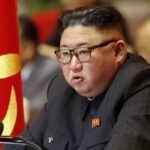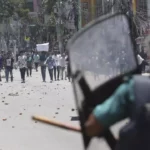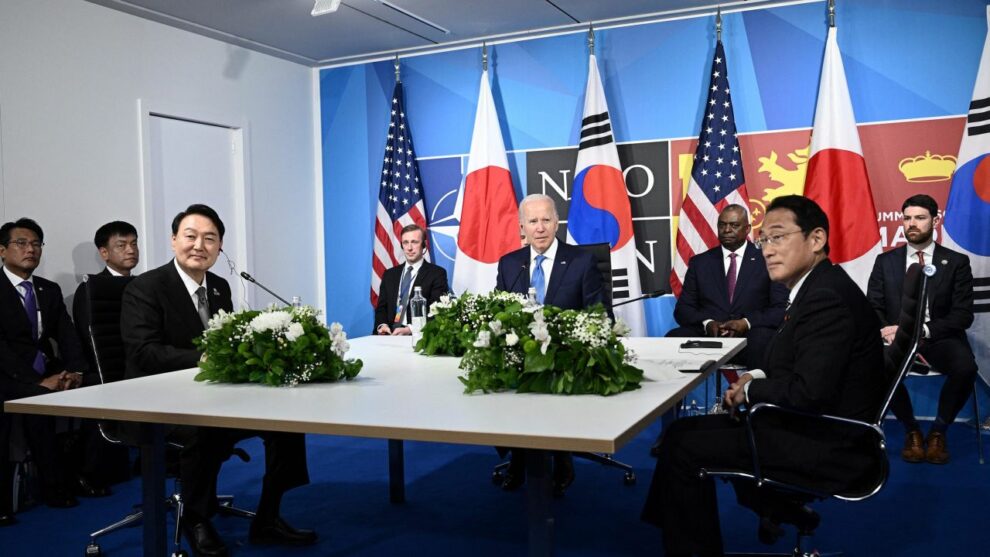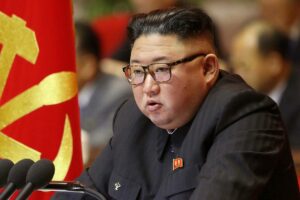In bringing together Japanese Prime Minister Kishida Fumio and South Korean President Yoon Suk-yeol to forge a landmark security pact, United States President Joe Biden has advanced an ambitious plan to overcome his two allies’ troubled past and usher in a new era of deterrence against common foes.
But the initiative comes as China, Russia and North Korea have intensified efforts to shore up their own ties and mount a united challenge toward what they view as an attempt to replicate a U.S.-led, NATO-style military posture in Asia, revitalizing Cold War-era frontlines at a particularly volatile moment for the region.
South Korea (officially the Republic of Korea) and North Korea (officially the Democratic People’s Republic of Korea) are doubling down on military maneuvers on rival sides of a yet unfinished war that first pitted Washington against Beijing and Moscow seven decades ago. Meanwhile, Japan is pursuing its largest defense build-up since World War II as China and Russia conduct unprecedented levels of security cooperation.
As the dueling actions raise regional tensions, the latest summit is expected to elicit a response already in the making.
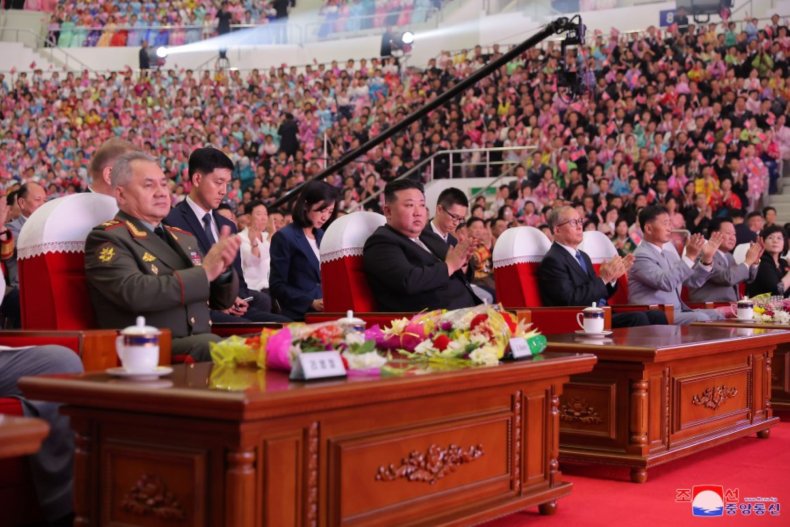
“The ‘NATOization’ of U.S.-Japan-ROK relations will only push China, Russia and the DPRK closer to each other,” Nakano Koichi, a professor at Sophia University in Tokyo, told Newsweek. “The logic of alliance security will obviously be met by the same strategy by its designated ‘enemies.'”
China, Russia and North Korea have long expressed a common wariness of any expansion of the U.S. military presence in the Asia-Pacific region, including the deployment of additional troops and weapon systems, as well as closer cooperation with allies and partners. But the nuclear-armed trio has demonstrated in recent days alone an intensification of this condemnation and a growing willingness to fortify their own relationships.
Discussing the Camp David summit at a press briefing Friday, Chinese Foreign Ministry spokesperson Wang Wenbin asserted that, “in a world of change and disorder on the security front, all parties should act on the vision of a community of shared security for mankind, practice true multilateralism, and jointly address various security challenges.”
“No country should seek its own security at the expense of other countries’ security interests and regional peace and stability,” Wang said. “The international community has its fair judgment on who is stoking conflicts and exacerbating tensions.”
“The Asia-Pacific is an anchor for peace and development and a promising land for cooperation and growth, and should never be turned into a wrestling ground for geopolitical competition again,” he added. “Attempts to cobble together various exclusionary groupings and bring bloc confrontation and military blocs into the Asia-Pacific are not going to get support and will only be met with vigilance and opposition from regional countries.”
On Tuesday, at the Moscow International Security Conference, Chinese Defense Minister Li Shangfu accused the U.S. of “playing with fire” over the disputed island of Taiwan, which Biden has repeatedly vowed to back in the event of an attempt by Beijing to achieve reunification through force. He also agreed on closer military cooperation with Russia as it presses on with its war against NATO-backed Ukraine.
As Washington intensified challenges to both Beijing and Moscow, Nakano said that “one would think that the U.S. would be better off isolating Russia, not pushing China to its embrace.”
He warned of the potential for Biden’s approach to further set the ground for the “Third World War to begin in East Asia over Taiwan, by importing Russia’s war in Ukraine here by the said NATOization.”
Beijing has increasingly developed its partnership with Moscow in recent years and has for decades cultivated its alliance with Pyongyang. However, the recent uptick in Russia-North Korea relations has marked a notable shift in regional dynamics.
Speaking at the same forum as Li, Russian Defense Minister Sergei Shoigu, who joined a Chinese delegation in visiting North Korea last month to mark the 70th anniversary of the Korean War Armistice, asserted that “the development of military cooperation” between Moscow and Pyongyang “corresponds to the vital interests of our people and does not create any threats to anyone whatsoever.”
That same day, North Korean Supreme Leader Kim Jong Un penned a letter to Russian President Vladimir Putin hailing “the militant friendship and solidarity established between the armies and peoples of the two countries in the grim days of struggle against the common enemy.” He promised “a long-standing strategic relationship in conformity with the demand of the new era.”
Also speaking at the Moscow defense gathering, North Korean Defense Minister Kang Sun Nam accused the U.S. of “driving the situation in Northeast Asia to the verge of a nuclear war outbreak.”
Russian Ambassador to North Korea Alexander Matsegora appeared to back this view during an interview with Russia’s RTVI the following day, arguing that “tensions on the Korean Peninsula are rising from these actions, reaching critical levels and forcing Pyongyang to bolster its defenses, carrying out various activities to restrain the aggressor and prevent a nuclear war.”
North Korean Foreign Minister Choe Son Hui also praised a “new period” of North Korea-Russia relations in a statement Wednesday. She affirmed Pyongyang’s desire to “strengthen strategic and tactical cooperation between states in the struggle to protect the sovereignty and security of countries, global peace and stability.”
As Biden strengthened ties with Japan and South Korea on Friday, Hinata-Yamaguchi Ryo, an assistant professor at the University of Tokyo’s Research Center for Advanced Science and Technology and senior fellow at the Atlantic Council, argued that all eyes will be on the next steps taken by China, Russia and North Korea.
“China, North Korea and Russia are likely to sharpen their postures and conduct more provocative maneuvers against the U.S., Japan and ROK, and also tighten their security relations,” Hinata-Yamaguchi told Newsweek.
“The point to watch will be how and whether Beijing, Pyongyang and Moscow will actually go beyond posturing and work toward institutionalizing their trilateral relationship,” he added.
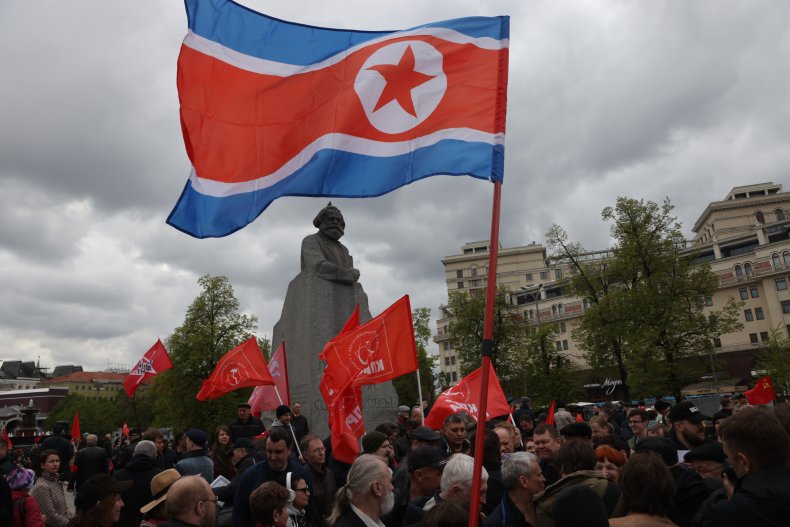
Jong Eun Lee, a former intelligence officer for the South Korean Air Force who serves as an assistant professor at North Greenville University in South Carolina, identified some potential next steps.
For Russia, Lee said, the primary concern will be “whether Japan and South Korea’s contribution to Ukraine War will increase after the trilateral summit.” And one tool available to Moscow “is to increase North Korea’s reciprocal involvement” in the conflict.
U.S. officials have cited intelligence alleging that Russia has sought artillery munitions and rockets from North Korea for use in Ukraine. Lee said this acquisition could be expanded to include KN-23 or KN-25 short-range ballistic missile systems, or even newly showcased drones that appear to mirror U.S.-made Reaper and Global Hawk systems.
“The visible presence of DPRK-made weapons on the Ukrainian front could cause caution on the part of Japan and South Korea in directly sending their military arms to Ukraine due to the anxiety over the perception of engaging in a proxy war with North Korea,” Lee told Newsweek.
The reverse situation also presents a threat. Another pressure point identified by Lee “could be Russia indirectly signaling a nuclear threat to the U.S. and U.S. allies by supporting DPRK’s nuclear development.”
Speculation has already mounted over potential Russian involvement in North Korea’s strides in missile development and Lee pointed specifically to similarities between North Korea’s new Hwasong-18 intercontinental ballistic missile and Russia’s Topol-M, both of which make use of solid fuel propellants.
“Even if Russia does not take public credit for the DPRK’s nuclear advancement, even suggestions of Russia’s contribution will signal a security warning to ROK, Japan, and even to the United States that the consequence of the so-called ‘NATOization’ of the Asia-Pacific would be the expansion of Europe’s security—and nuclear—crisis into East Asia as well,” Lee said.
All the while Beijing was likely to play a more muted, yet strategically consequential role in this rapidly developing dynamic in regional geopolitics.
“China is unlikely to risk its international image by openly supporting North Korea’s nuclear program,” Lee said. “My theory is that China is more inclined to play the ‘one good cop among two bad cops,’ so to speak, in implicitly tolerating—and even taking advantage of—the militant behaviors of Russia and DPRK while publicly playing the role of restrainer over its two strategic partners.”
Yang Uk, a research fellow at the Seoul-based Asan Institute for Policy Studies Center for Foreign Policy and National Security and former policy advisor to South Korea’s National Defense Ministry, told Newsweek that “trilateral cooperation between North Korea, Russia and China will be definitely affecting ROK-U.S.-Japan cooperation” and that “we should be vigilant” regarding what comes next.
Yang described Pyongyang as being “on the edge from the recent Washington Declaration” put forth by Biden and Yoon in May, when the two leaders reaffirmed their mutual deterrence efforts, including in the nuclear realm. As such, Yang said North Korea will likely respond to the Camp David summit “by shooting more missiles and doing military demonstrations.”
As for Beijing, Yang said it “will see the meeting as the systematic approach for blockade of China,” while, echoing Lee, he said Moscow’s focus “should be limited to the meeting’s implications in the Russian war effort” in Ukraine.
At the same time, Yang saw “no need for an urgent response” from the U.S., Japan and South Korea in the absence of any escalations outside of mere comments and statements. He warned of another lurking threat to Biden’s initiative, one that continues to haunt longstanding efforts to reconcile Japan and South Korea.
“The big obstacle to overcome between South Korea and Japan is the current issues that originated from history,” Yang said, “such as Dokdo—which Japan claims as its territory—and history textbooks that distort their invasion.”
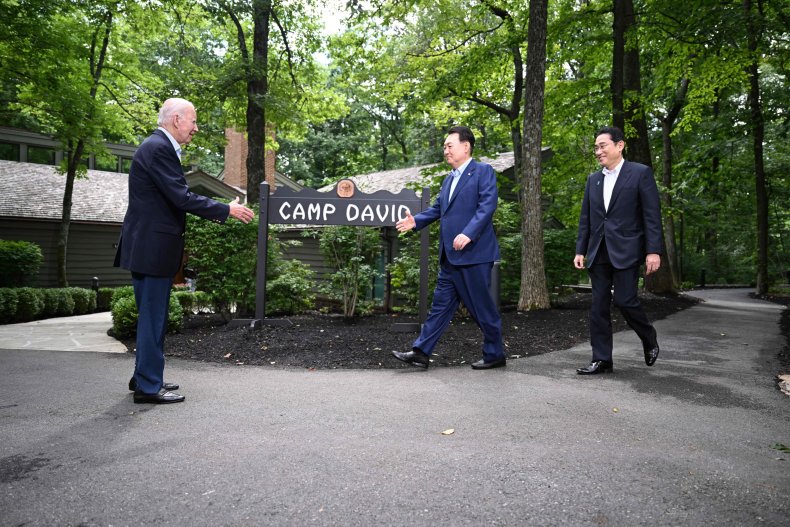
The Liancourt Rocks, known in South Korea as Dokdo and in Japan as Takeshima, are a South Korean-controlled, contested set of islands that lie between the two nations. Located in what’s known to Japan as the Sea of Japan and to South Korea as the East Sea, they represent one of many areas of dispute between two countries with a difficult history, much of which stems from Japan’s occupation of the Korean Peninsula from 1910-1945.
While both Kishida and Yoon have sought to improve ties, including through a bilateral summit in March that marked the first of its kind in 12 years, historical wounds continue to reopen.
Just days before the Camp David gathering, Kishida paid respects to the Yasukuni Shrine, which honors more than 150 years of Japanese war dead, including World War II-era figures designated war criminals by the Allies-led International Military Tribunal for the Far East. Both China and South Korea issued protests in response to the visit, which commemorated the 78th anniversary of Japan’s World War II surrender.
Beijing, Moscow and Pyongyang have been quick to capitalize on the painful memories between Tokyo and Seoul, but such events also arouse significant attention from domestic audiences.
“If the South Korean public perceives that Yoon’s government’s overture for improved ties with Japan does not result in a reciprocal response from Japan to accommodate South Korea’s interest, there is a risk of political backlash,” Lee, of North Greenville University, said.
And while Lee said that “perhaps the escalation of security tensions with China and DPRK will cause South Koreans to accept Japan as a necessary security partner,” he also noted that, “for now, the majority of the South Korean public appears to think South Korea is the one making concessions to help advance Japan’s interest first.”
Nakano, of Sophia University, also observed how “Japanese conservatives got off the hook by single-mindedly pleasing the U.S. with its enhanced promise for military contribution without conceding an inch to the South Koreans over the history issues.”
As such, he said “the current rapprochement between Japan and South Korea can only be maintained” so long as two key factors were at play. The first is that “South Korea is governed by the conservatives who are willing and able to suppress the civil society opposition to Japan’s persistent historical revisionism” and the second is that “the U.S. is interested in pushing the two junior partners to get along in an attempt to confront China by a show of force.”
Even as the U.S.-Japan-South Korea summit shows promise for bringing about substantive change in the relationship between Tokyo and Seoul, Hinata-Yamaguchi of Tokyo University stated that “the key issue is how to make the trilateral framework and its commitments sustainable.”
“Although the purpose of deepening and regularizing the trilateral framework is to make it hard to reverse when administrations change,” he added, “more effort is needed at various levels between Japan and the ROK to build confidence and trust, and there will also need to be some patience to prove the benefits and effects of the framework.”
Source : Newsweek

